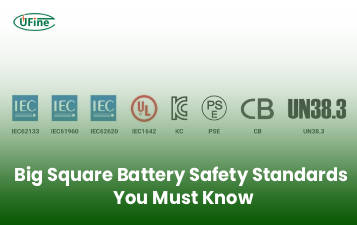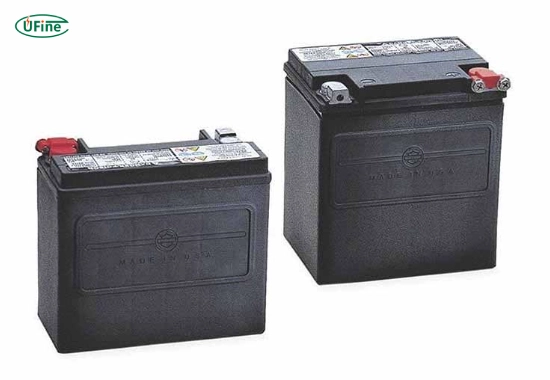
- Part 1. What is a Harley lithium battery?
- Part 2. Why is battery capacity essential for your Harley?
- Part 3. How to find your Harley's battery requirements?
- Part 4. What Harley lithium battery capacity do you need?
- Part 5. How to compare lithium battery brands?
- Part 6. Can a lithium battery replace your stock Harley battery?
- Part 7. How to install a Harley lithium battery?
- Part 8. How to maintain a Harley lithium battery?
- Part 9. What are common mistakes when choosing a Harley lithium battery?
- Part 10. FAQs about Harley lithium batteries
- Part 11. Final thoughts on choosing the right Harley lithium battery capacity
Looking for the best Harley lithium battery for your motorcycle? Choosing the right battery capacity is crucial for performance, reliability, and safety. The wrong battery can leave you stranded, while the right one enhances power, lasts longer, and gives you peace of mind.
In this guide, we’ll break down everything you need to know about Harley lithium batteries — from how they work, what capacity you need, and how to make the best choice for your ride. Let’s dive in!
Part 1. What is a Harley lithium battery?
A Harley lithium battery is a lightweight, high-performance power source designed specifically for Harley-Davidson motorcycles. Unlike traditional lead-acid batteries, lithium batteries use Lithium Iron Phosphate (LiFePO4) technology, offering higher energy density, faster charging, and a longer lifespan.
Key benefits of lithium batteries for Harley riders:
- Lightweight: Up to 80% lighter than lead-acid batteries.
- Longer lifespan: Can last 5-10 years with proper care.
- Faster charging: Charges up to 4 times faster.
- More cranking power: Delivers high cold cranking amps (CCA).
- Low self-discharge: Holds charge longer when not in use.
Part 2. Why is battery capacity essential for your Harley?
Battery capacity determines how much energy your battery can store. If you choose a battery with too little capacity, your bike may not start reliably. If it’s too big, you may be wasting money and space.
Battery capacity is measured in:
- Amp-hours (Ah): How much current the battery can deliver over time.
- Cold Cranking Amps (CCA): How much power the battery provides to start your bike in cold temperatures.
For Harley riders, both Ah and CCA are critical for smooth starts and consistent performance.
Part 3. How to find your Harley’s battery requirements?
Start by checking your Harley-Davidson owner’s manual. It lists the recommended battery specs, including:
- Voltage (usually 12V)
- Amp-hour rating
- Minimum CCA
You can also check the label on your current battery or contact your local Harley dealer.
Here’s a quick reference for popular Harley models:
| Harley Model | Recommended CCA | Recommended Ah |
|---|---|---|
| Sportster 883/1200 | 220+ | 10-12 Ah |
| Softail | 300+ | 14-18 Ah |
| Touring (Road King) | 350+ | 18-22 Ah |
| Street Glide | 400+ | 20-30 Ah |
Part 4. What Harley lithium battery capacity do you need?
The right Harley lithium battery capacity depends on your bike model and how you ride.
For daily riders:
If you ride often, especially in urban areas, you’ll need a battery with higher CCA to handle frequent starts.
For weekend cruisers:
A moderate capacity lithium battery with a reasonable self-discharge rate is ideal. It stays charged even if you don’t ride every day.
For custom builds:
If you’ve added accessories like LED lights, GPS, or a sound system, choose a battery with a higher Ah to support the added load.
Part 5. How to compare lithium battery brands?
Not all lithium batteries are created equal. When comparing, look for:
- Accurate capacity ratings (not just peak performance)
- Built-in Battery Management System (BMS) for safety
- Warranty period (3+ years is ideal)
- Cold-weather performance
- Trusted brand reviews
Top-rated brands for Harley lithium batteries include:
- Antigravity
- Shorai
- EarthX
- Battery Tender
- NOCO
- Ufine Battery (offers custom lithium-battery solutions)
Part 6. Can a lithium battery replace your stock Harley battery?
Yes, a lithium battery can replace your stock battery, but you must make sure:
- Voltage matches (most Harleys use 12V)
- Physical size fits in your battery tray
- Terminal orientation is correct
- Capacity (Ah and CCA) meets or exceeds your current setup
Lithium batteries may be smaller, so you might need foam spacers to secure them.
Part 7. How to install a Harley lithium battery?
Installing a Harley lithium battery is simple if you follow these steps:
- Turn off the ignition and disconnect the old battery.
- Remove the negative cable first, then the positive.
- Install the new lithium battery, connecting the positive terminal first.
- Secure the battery with the bracket or foam spacers.
- Double-check terminal tightness and polarity.
⚠️ Never use a standard lead-acid charger on a lithium battery unless it’s compatible. Always use a lithium-specific charger.
Part 8. How to maintain a Harley lithium battery?
Lithium batteries require less maintenance than lead-acid ones, but here’s how to keep them in top shape:
- Keep it charged: Use a trickle charger if storing your bike for long periods.
- Avoid extreme temperatures: Store indoors during winter.
- Clean terminals occasionally to prevent corrosion.
- Monitor with a voltmeter: The Ideal voltage is around 13.2V when fully charged.
Part 9. What are common mistakes when choosing a Harley lithium battery?
Avoid these common pitfalls:
- Buying the wrong size or terminal layout
- Choosing a battery with insufficient CCA
- Using incompatible chargers
- Ignoring quality and buying cheap brands
- Not checking the return policy
Spending more on a quality lithium battery pays off in performance and reliability.
Part 10. FAQs about Harley lithium batteries
Can I use a lithium battery year-round on my Harley?
Yes, but if you ride in winter, choose a lithium battery with cold-weather start technology. Some lithium batteries struggle below 32°F (0°C).
Do lithium batteries last longer than lead-acid?
Absolutely. A lithium battery can last 2-4 times longer, with up to 2000 cycles versus 300-500 for lead-acid.
Is it safe to use lithium batteries on my Harley?
Yes, as long as the battery has a built-in BMS and you follow the manufacturer’s installation guidelines.
What happens if I overcharge a lithium battery?
Overcharging can damage the battery or cause it to overheat. That’s why a BMS and a proper charger are essential.
Do lithium batteries require a special charger?
Yes, always use a lithium-compatible smart charger. Regular chargers may not recognize when a lithium battery is full.
Part 11. Final thoughts on choosing the right Harley lithium battery capacity
Choosing the correct Harley lithium battery is all about matching your bike’s needs with the right capacity. Focus on CCA, Ah, and battery quality. Whether you’re a weekend warrior or a daily commuter, the correct battery will give you better starts, smoother rides, and fewer headaches.
Related Tags:
More Articles

Big Square Battery Safety Standards You Must Know
Learn key safety standards for big square batteries to avoid fire risks, shipping delays, and compliance issues in EV, industrial, and energy storage projects.
Big Square Battery Applications in Solar & Industrial Equipment
Big square batteries deliver high capacity, stable output, and long life for solar, industrial, and backup power. Explore key uses and advantages.
Big Square Battery vs Cylindrical Battery: Complete 2025 Guide for EVs, ESS & Industrial Devices
Choosing the right battery is key for designers and engineers. Compare big square vs cylindrical batteries to find the best fit for your application.
How to Choose the Right Big Square Battery for Your Device?
If you’re choosing a big square battery for EVs, solar, or mobility devices, this guide helps you pick the right solution for real-world needs.
Big Square Battery Complete Guide: Types, Uses & Buying Tips
If you are choosing a big square lithium battery for EVs, solar, RVs, or AGVs, this guide helps you select the right NMC, LFP, or LTO solution with examples.



